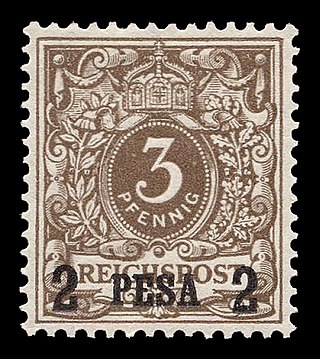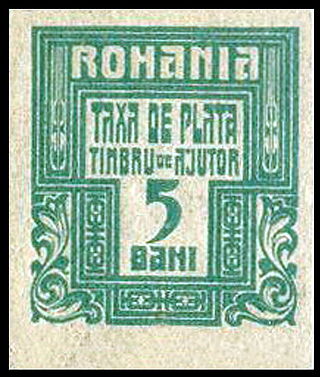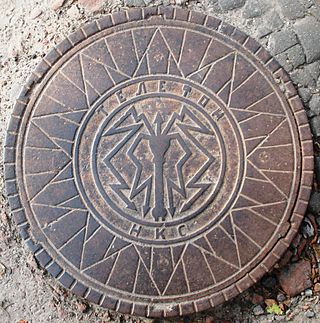This article needs additional citations for verification .(December 2013) |

This is a list of countries that have used postal orders .
This article needs additional citations for verification .(December 2013) |

This is a list of countries that have used postal orders .

This is a survey of the postage stamps and postal history of German East Africa.

The British Central Africa Protectorate existed in the area of present-day Malawi between 1891 and 1907.
Each "article" in this category is a collection of entries about several stamp issuers, presented in alphabetical order. The entries are formulated on the micro model and so provide summary information about all known issuers.
This is a survey of the postage stamps and postal history of Transnistria, an unrecognized breakaway territory of Moldova and the de facto independent Pridnestrovian Moldavian Republic.
The following is a list of the political history of East Africa.
In philately, an omnibus issue is an issue of stamps by several countries with a common subject and which may share a uniform design. Omnibus issues have often been made by countries under common political control or groups of colonies due to the close co-operation required to produce the issue. Omnibus issues are to be distinguished from joint issues which are usually much smaller in scope.

The Ministry of Communications of the Union of Soviet Socialist Republics (USSR) (Russian: Министерство связи СССР) was the central state administration body on communications in the Soviet Union from 1923 to 1991. During its existence it had three names: People's Commissariat for Posts and Telegraphs (1923–32), People's Commissariat for Communications (1932–46) and Ministry of Communications (1946–1991). It had authority over the postal, telegraph and telephone communications as well as public radio, technical means of radio and television broadcasting, and the distribution of periodicals in the country.

This is a survey of the postage stamps and postal history of Zimbabwe.

People's Commissariat for Posts and Telegraphs of the RSFSR, known shortly as the Narkompochtel, was the central organ of government of the RSFSR that was in charge of the organisation and development of the different forms of communication, including postal service. It was founded in Petrograd on 7 November [O.S. 25 October] 1917 from the Russian Ministry of Posts and Telegraphs and retained its organisational structure.

The Mosely Collection of British Africa stamps dating to 1935 was formed by Dr Edward Mosely of Johannesburg, South Africa. The collection was donated to the British Museum by his daughter, Kathleen Cunningham, in 1946 and is now held as part of the British Library Philatelic Collections. After the Tapling Collection, this is considered the Library's most important philatelic acquisition due to the number of countries represented and the number of unique items included.

The Crown Agents Philatelic and Security Printing Archive was deposited with the British Museum from the 1960s, though the first recorded deposit from the Crown Agents was in 1900. The archive consists of a range of philatelic and written material which were the Crown Agents' working records. It is the most comprehensive record of British Colonial and Commonwealth stamp issues of the last 100 years.

War tax due stamp is a kind of war tax and postage due stamps that was used for mail when the war tax has not been paid by the sender. They were issued in Romania between 1915 and 1921.

Moscow Society of Philatelists and Collectors was one of the first philatelic organisations in Soviet Russia that appeared in Moscow in 1918. Later on, it ceased and was replaced with the All-Russian Society of Philatelists.

Moscow Society of Stamp Collectors was one of the first philatelic organisations in the Russian Empire that was created in Moscow in 1883. Later on, it was dissolved and restored in 1907.

Russian Bureau of Philately was a special organisation under the People's Commissariat for Posts and Telegraphs of the RSFSR in 1921–1924. This was the first Soviet government agency in charge of all matters of the organisation and development of philately.

The People's Commissariat for Communications of the USSR was the central state agency of the Soviet Union for communications in the period 1932 to 1946. The Commissariat administered the postal, telegraph and telephone services.

People's Commissariat for Posts and Telegraphs of the USSR was the central organ of the Soviet Union government that was in charge of the organisation and administration of the different forms of communication including posts. It existed between 1923 and 1932.